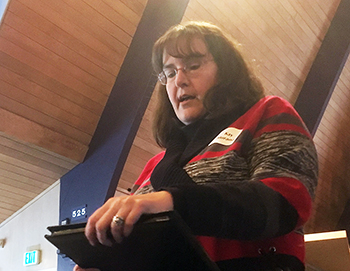2017 Eastern Washington Legislative Conference
Consortium keeps up with issues affecting affordable housing opportunities
 |
| Kay Murano, Spokane Low Income Housing Consortium |
Kay Murano, executive director of the Spokane Low Income Housing Consortium (SLIHC), said in a workshop at the Eastern Washington Legislative Conference that SLIHC member organizations are involved in developing, owning, managing or supporting low-income housing.
With Spokane’s vacancy rate of 1.2 percent in 2016, finding a place to live was difficult, she said, so 1,345 children in Spokane Public Schools and 867 in Spokane Valley schools experienced homelessness.
While the collaboration of agencies can bring results, she expects that work to be difficult in today’s political climate.
On the national level, the President said in his campaign he would cancel a planned Federal Housing Administration mortgage fee reduction for first-time homebuyers.
The 2011, the U.S. Budget Control Act established low spending caps for defense and non-defense spending.
“Each year since, Congress passed short-term agreements to raise spending above those caps. The President wants to lift the cap on defense spending, but keep the non-defense spending cap. This could be devastating to housing programs,” she explained.
In addition, he proposes a one-percent cut in non-defense spending each year for the next 10 years. So spending is reduced by the cap and by one percent more each year.
“We need legislators to raise non-defense spending caps the same amount defense spending is raised, or much federal funding we receive through HUD, FEMA, HOME and CDBG will be reduced so drastically that some programs will close,” Kay said.
A Low Income Housing Tax Credit (LIHTC) Program gives businesses tax credits to invest in low-income construction projects, such as Fr. Bach Haven, Buder Haven and the Marilee.
“The President’s proposed tax reform for businesses may reduce their interest in buying tax credits, which they won’t need if their taxes are reduced,” she said. “That source of funding is already decreasing based on speculation.”
Kay said Senator Maria Cantwell has introduced a bill to expand the LIHTC program by 50 percent over five years.
“At the state level, one of the largest sources of funding for homeless services is document recording fees paid through real estate transactions,” she said.
The current fee is $60, whether a house is worth $200,000 or $200 million. The fees will sunset in three years, so legislators need to revisit the issue and retain the fees.
“In 2016, Spokane served 4,758 homeless individuals, according to the state’s Homeless Management Information System. Document recording fees were 35 percent of regional funding for homeless services,” Kay said.
Opponents of the fees say it’s not a consistent source of funds. In an economic downturn, fewer people buy homes, so less funding is available, but she said that is the case with every source of state revenue: sales tax revenue decreases if people buy fewer things, and property tax levies generate less if property tax values decrease, she said.
SLIHC supports HB1570. It would permanently remove the sunset, increase the fee by $50 and broaden flexibility of the 45 percent mandate for private landlords to include nonprofits and landlord liaison projects. It would reduce reporting requirements so funding is used for homeless services, not audits.
SB5254, backed by the real estate industry, extends the sunset eight years, allowing time for reforms to the Growth Management Act, but it does not increase the amount or amend the 45 percent mandate.
In 2015, the legislature passed HB2263 that allows a region to impose a sales or property tax to fund services for those with mental illness, developmental disabilities and other vulnerable populations.
Funding could be used for mental health services, evaluation and treatment facilities, housing and other services, Kay said.
Counties were given priority to enact this. If Spokane County raised the sales tax, it would generate $8 to 9 million a year, but “an increased sales tax puts a greater burden on those we’re trying to help, so a property tax may be a better choice,” Kay said.
Spokane County has until Octo-ber 2017 to put a measure on the ballot to implement a sales or property tax, she said.
Kay also reported on Source of Income Discrimination. Some landlords won’t rent to tenants who pay for their housing with a voucher.
“The federal voucher program assists very low-income families, the elderly and the disabled so they can afford decent, safe and sanitary housing in the private market,” she said. “The voucher pays the difference between what a tenant can afford (30 percent of their income) and the market rate.”
When multiple apartment complexes in Renton said they would no longer accept rent payments from the local housing authority that uses vouchers, the story made the news. Then landlords reversed their decision and let voucher tenants stay, Kay said.
HB 1633, banning source of income discrimination, passed out of the Judiciary Committee and was headed to the House floor in late February.
Some landlords say tenants on vouchers often do more damage, she explained. So last year, the state enacted legislation that landlords can be reimbursed $500 to $5,000 per instance for damages if they are in a jurisdiction that has passed source of income discrimination legislation, but Spokane city and county do not have such legislation in place.
Given daily changes to the status of bills, the Washington Low Income Housing Alliance has a bill tracker for the state legislature at www.wliha.org/bill-and-budget-tracker
For information, call 325-3235 or visit slihc.org.
Copyright © March 2017 - The Fig Tree






